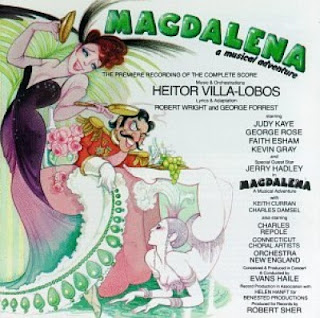Listening Recommendation: "Magdalena" by Heitor Villa-Lobos (1887 - 1959)
Heitor Villa-Lobos is, of course, best remembered for his sets of "Bachianas Brasileiras" and "Chôros". This comes at no surprise, as the young Heitor was introduced by his father, an amateur musician, into learning the 'cello, but later also taught himself to play the guitar. With the former, his favourite pieces soon became J S Bach's Cello Suites, whilst with the latter, he would play many contemporary pieces then popular in Rio de Janeiro including the so-called choros, a form of folk-like street music. To earn a living, the young musician regularly performed in the coffee houses and cinemas of his home town, where a repertoire of European light music was much in demand. On the other hand, during extensive trips into the Brazilian countryside, including the jungle, it is said that he became familiar with the 'real' music of his country. As a composer, however, Villa-Lobos remained mainly self-taught.
 |
| "Magdalena" CD cover from 1989 |
Amongst his stage repertoire are the three main operas - Izath (1914), Yerma (1955), A Menina das Nuvens (1957-58) - but there is one notable exception: a digression - or perhaps rather an excursion - into the world of lighter entertainment, in the case of his 'light opera', or operetta "Magdalena: A Musical Adventure" in two acts, which was premiered in Los Angeles in 1948 and followed by a few more performances on New York's Broadway the same year.
 |
| Villa-Lobos with Brazilian instruments |
However, it speaks for Villa-Lobos' craftmanship and dramatic talent, that in such a stage work he manages throughout to combine numerous musical influences indicative of his manifold style: a colourful, rhythm-infused "jungle" music**, folkloristic South American tunes, great sweeping melodic lines, a subtle yet profound humour, as well as musical hints at the "Grand Salons" of the European fin de siècle; quite fittingly here, when Madame Teresa sings "Bon Soir, Paris", Villa-Lobos chooses effectively the wistful music from his famous 1932 piano piece Valsa da Dor ("Waltz of Pain").
It is mainly through the immediate appeal of its music rather than courtesy of the libretto, that "Magdalena" has survived and - apart from a recording made in 1989 *** - has seen renewed stage performances in recent years, not only in his native Brazil but in 2010 at the Théâtre du Châtelet in Paris.
 |
| Heitor Villa-Lobos caricature |
__________________________
* a 13th & 14th "Chôro" are presumed lost.
** i.e. Uirapurú, Amazonas, O Descobrimento do Brazil, Floresta do Amazonas, are amongst other works which feature a variety of poly-rhythms, melodies, harmonies and exotic instruments which depict the composer's own views of the glorious, sprawling nature of his native wilderness and its indigenous people.
*** a suite - arranged and conducted by Andre Kostelanetz - had previously been recorded by the New York Philharmonic Orchestra in 1974.


Comments
Post a Comment